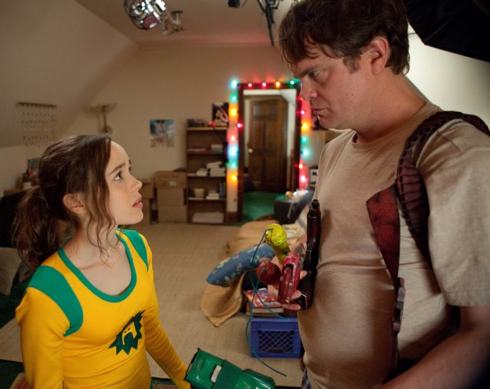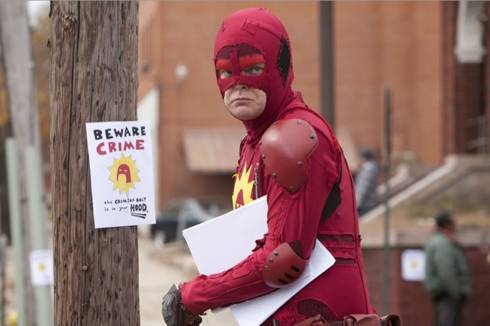Before I begin, I should mention that I’m not a huge Martin Scorcese fan. I watched Tax Driver about a year ago but couldn’t figure out what the fuss was. It was okay. And yes, I get that it exemplified the innovations in filmmaking and the societal changes of a specific era, but there was nothing in that film that made me relate to its main character Travis Bickle in any way other than a surface, intellectual understanding of what he was trying to accomplish.
Super is Taxi Driver with a superhero motif, but the main character of Super, Frank D’Arbo, is an antihero I completely relate to.
Frank (heartbreakingly performed by Rainn Wilson) is a loser in every sense of the word. Good things happen to him so infrequently that he can only recall two perfect moments in his life: the day he pointed a police officer in the direction of a fleeing mugger, and the day he married Sarah (Liv Tyler). Sarah is a recovering drug addict in a 12-step program who sees in Frank a chance to be with a “nice guy” for a change. She quickly gets bored and leaves him for a sleazy strip club owner named Jacques (Kevin Bacon), who gets her addicted to heroin again. To say that Frank is devastated by her loss is an understatement. Inspired by a religious superhero on a Christian children’s show called The Holy Avenger (in a hilariously mulleted appearance by Nathan Fillion), Frank decides to study superheroes in comics and become The Crimson Bolt, in order to fight evil and save the woman he loves. It is in a comic shop that he meets a young woman named Libby (Ellen Page in a stunningly vulgar, hilarious, and maniacal performance), who is thrilled to know someone who’s actually putting on a costume and fighting evil, and decides to become his sidekick, Boltie.

Sounds all cute and noble doesn’t it? Yeah, it’s neither of those things. Though we are often lulled into siding with Frank and understanding where he’s coming from, he is clearly disturbed. This is what makes the film so great. It forces you to reassess your values and think about which are actually based in morality and which are based in your own fears and insecurities.
It was refreshing to see a film in which a geek is taken seriously and is not a constant punchline. This movie has plenty of laughs, but it isn’t a comedy. For every laugh, you have a million moments that are dramatic, heartbreaking, or hugely deranged. It’s a difficult balance to strike, but writer/director James Gunn does it well, making the entire enterprise feel believable even as the unbelievable is happening. (Like Nathan Fillion’s hair.)
And then, there’s the rape scene. And yes, it’s a rape scene, though when it’s mentioned in other reviews at all, they use words like “ravished” to describe it, or offer parentheticals like “(which could qualify as rape).” I’m not talking about the attempted rape of Sarah, though that happens, too. I’m talking about when Libby rapes Frank.
Yeah, you read that right. Libby rapes Frank.
It begins like a stereotypical male fantasy. Libby, dressed in her Boltie costume and in full crush-mode for Frank, tries to seduce him. It’s funny, as she’s not particularly good at it. He is trying to sleep, and is also not at all attracted to Libby, because he’s so deeply in love with Sarah that no other women exist. Then Libby pounces on him more aggressively, putting his mask on him, begging him to have sex with her. As he continues to protest, she gets more violent, throwing punches at him as he’s swatting her away and begging her to get off of him. Eventually, she reaches down into his pants and forces him to have sex with her. Libby is tiny. Frank is 6’5” tall. He could have easily thrown her off. But men are generally taught not to “hit girls.” He did everything short of clock her in the face, saying “No!” the entire time, and she did it anyway. And he throws up afterwards. It was horrible to watch, and I felt sorry for Frank in that moment. He just didn’t know what to do or how to handle it. Once again in his life, he was a victim.
What’s interesting is that, in talking about the film, Gunn insists that we’re supposed to laugh at that scene. Now, Super is chock full of moments that are clearly funny and moments that are clearly serious. What exactly was supposed to be funny about a man being raped? I think one of the strengths of this movie is that it wasn’t funny; that it took Frank’s victimhood seriously It wasn’t just about him being picked on in school, it was about his whole life being one moment of humiliation after another—and this was one of them. It’s interesting, then, that so many reviewers—and even the filmmaker himself—are willing to look the other way on this one. Since it’s happening to a man, it’s clearly funny, right? Because real men never get raped. Real men would be able to handle a situation like this. Real men are never victims, right? Right?
So, my one criticism of Super has less to do with the film itself and more to do with its director and how the film is being presented. If you were to go purely by the marketing campaign and Gunn’s talking about it, you’d think this movie was a laugh riot. It’s not. It’s a serious examination of a loser’s life. It’s a story that rarely gets told that uses familiar pop culture motifs in an unfamiliar way. It’s good. I wish Gunn and IFC Films would have faith in that and stop trying to convince people that it’s a comedy in order to ingratiate themselves to moviegoers. Let the movie be what it is: a Taxi Driver for the modern geek.
Teresa Jusino is two years older than Buffy Summers. Her “feminist brown person” take on pop culture has been featured on websites like ChinaShopMag.com, PinkRaygun.com, Newsarama, and PopMatters.com. Her fiction has appeared in the sci-fi literary magazine, Crossed Genres; she is the editor of Beginning of Line, the Caprica fan fiction site; and her essay “Why Joss is More Important Than His ‘Verse” is included in Whedonistas: A Celebration of the Worlds of Joss Whedon By the Women Who Love Them, which is on sale now wherever books are sold! Get Twitterpated with Teresa, or visit her at The Teresa Jusino Experience.










